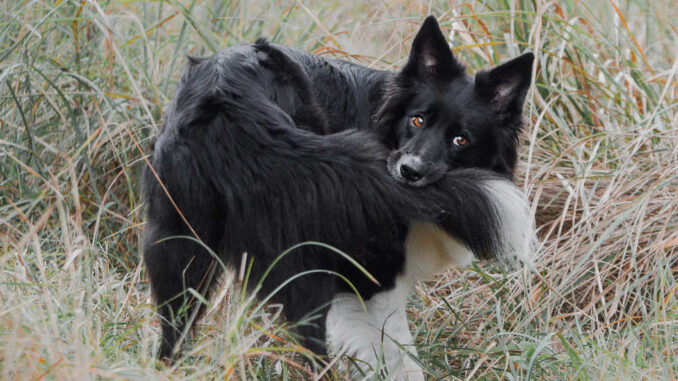
This article was updated on August 3rd, 2023
Dogs chasing their tails can seem like just a quirky behavior – but what does it mean if your dog progresses to chewing the hair off their tail? As well as hair loss, excessive chewing can cause trauma and infection, and could also indicate an underlying health problem. So what causes this – and when should you be worried?
Should I be worried if my dog just chewed hair off their tail?
Many different conditions can cause dogs to chew their tails, and they’re often easily treated. One important thing to note is whether your dog is actively chewing and causing hair loss or whether they’re experiencing hair loss without significant chewing. If hair loss is caused by chewing, you’ll usually be able to see broken, frizzy hairs and saliva staining or dampness from saliva.
Common causes of agressive tail chewing
1. Parasites
Fleas, ticks and mites (which cause mange) are common causes of itchy skin and this can include the tail. Fleas are most common and symptoms are often worst over the lower back and base of the tail. Some dogs are hypersensitive to flea saliva and experience an allergic reaction that can cause severe itching in response to only a few bites, so you may not see visible fleas or flea dirt. Applying an effective parasite treatment should lead to resolution, although conditions like mange can be more challenging to treat without veterinary input.
Intestinal worms may also cause itching around the anus and base of the tail, which can cause scooting, licking and chewing around this area. Treatment with an effective wormer should rapidly resolve this.
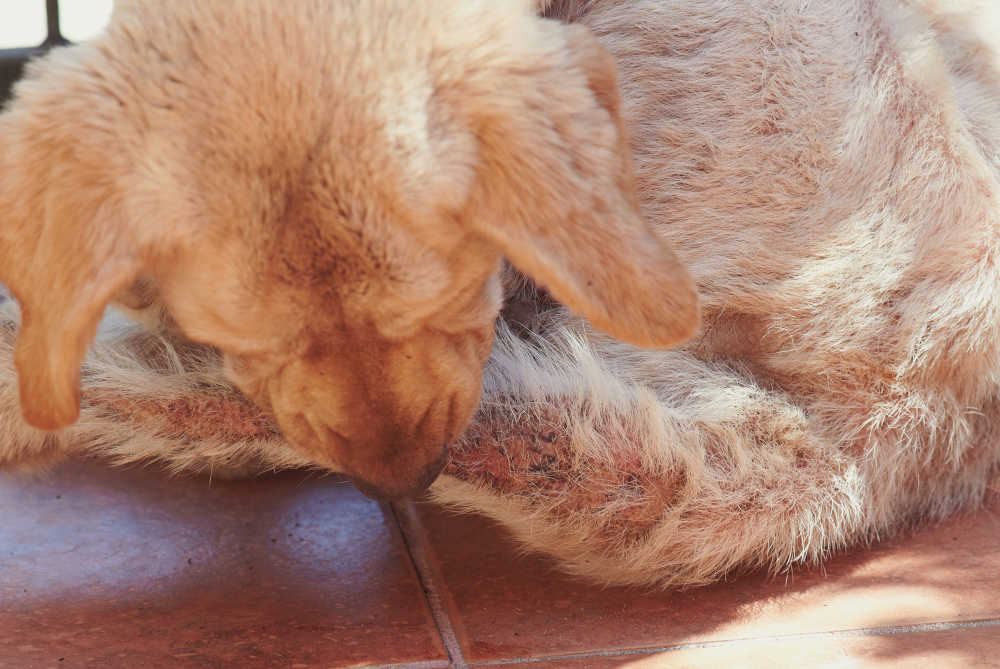
2. Allergies
Dogs can react to environmental allergens like molds, pollen, dust mites or food-based allergens, resulting in severe itching. While the paws, ears and belly are frequently affected by allergies, some dogs may experience itching around their tails – and this can cause significant chewing and self-trauma. Learn more about allergy skin rashes or environmental allergies and skin issues.
3. Psychological factors
For some dogs, tail chewing may indicate a mental rather than physical problem. Dogs that are stressed, anxious or bored can exhibit a range of abnormal behaviors, including excessive chewing – both of objects and themselves. Affected dogs can cause themselves significant injuries, so this isn’t something to overlook.
4. Skin infections
Infections like hot spots can occur anywhere, including the tail. Excessive chewing can be the cause or the result of a skin infection, but either way the infection is likely to need veterinary attention. Treatment usually involves cleaning the affected area and topical or systemic antibiotics, pain relief and a collar to prevent further chewing.
5. Anal gland issues
Overly full or impacted anal glands can cause significant discomfort, resulting in ‘scooting’ or licking and chewing around the base of the tail. Other symptoms include malodor, fluid leaking from the anal area and swelling or redness around the anus. It’s best to get your vet to check these, as expressing them can be uncomfortable for your dog, and if infection is present they may require further treatment. Find out how to tell if your dog’s anal glands are full.
6. Tumors
Growths like mast cell tumors on your dog’s tail can also cause itching and inflammation. If you notice a lump in the area that your dog is chewing, it’s best to get this checked by your vet as soon as possible. Learn more about bumps or lumps often found on tails.
7. Pain
Finally, dogs also chew at painful areas. Some dogs injure the tip of their tail – often from wagging it too hard! – and subsequently chew it to cope with the resulting discomfort. Other sources of pain include foreign bodies like grass seeds, arthritis, or fractures. You may notice other symptoms like your dog being reluctant for you to touch their tail, but sometimes the only symptom will be your dog’s chewing.
How to find the cause
Diagnosis at the vet may be possible based on a clinical examination. Further tests can include checking the anal glands, taking skin scrapes to assess under the microscope or a fine needle aspirate to sample any lumps. Diagnosis may also include assessing the response to parasite treatment or pain relief.
How can I stop my dog from chewing their tail so aggressively?
Using a buster collar can prevent your dog traumatizing their tail – but this should only be an interim step while you consult with a vet or wait for other treatments to take effect. Your dog is chewing for a reason so preventing this can cause a lot of frustration!
If you suspect a psychological cause, try increasing your dog’s mental stimulation by giving them interactive toys, increasing the frequency or length of their walks, and avoiding leaving them alone or in a crate for long periods.
When should I consult a veterinarian?
If your dog is causing hair loss, the chewing is probably severe enough that you should consider seeing a vet. If symptoms of an infection or anal gland issue are present, treatment is more urgent as these can progress quickly.
Would a vet be able to help over a video call?
While a vet may be able to provide some advice over video call, it can be difficult to diagnose the cause of tail chewing without a physical examination. Signs of skin infections or parasites can be relatively subtle, and it’s impossible to check anal glands over a call! However, this may be a low-cost option to discuss chewing that seems more behavioral.
Frequently Asked Questions
- How long does it take for hair to grow back on the tail?
Hair growth usually starts within 6 weeks but it can take several months to fully re-grow. This also depends on breed, age and other health issues.
- Can tail chewing cause any long-term damage?
Potentially – in most cases if the root cause is removed the tail should recover fully, but severe trauma may cause scarring. If your dog has chewed for a long time, it may also become a behavioral issue and fail to resolve, even if the original cause is treated.
Related posts:
Disclaimer: This website's content is not a substitute for veterinary care. Always consult with your veterinarian for healthcare decisions. Read More.


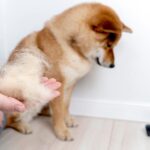


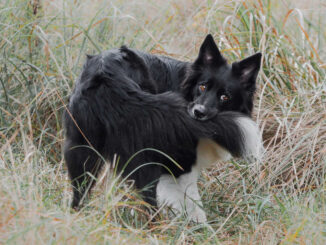
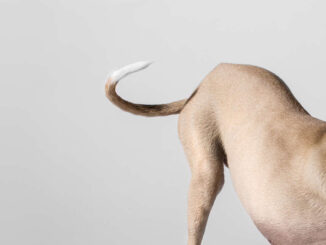
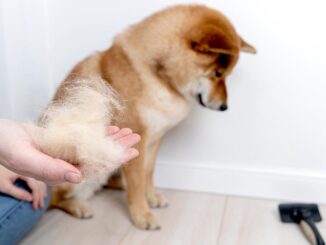
Be the first to comment